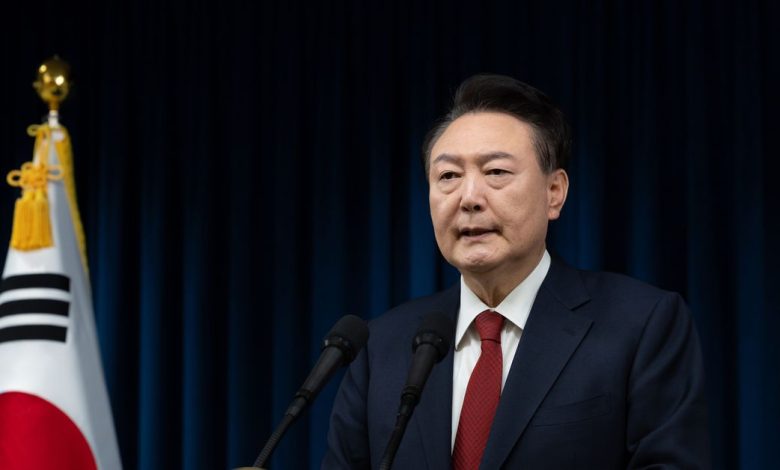South Korean president apologises, saying he’ll take responsibility for attempt at martial law

South Korea’s embattled president apologized today for public unrest caused by his short-lived attempt to impose martial law hours before a parliamentary vote to impeach him.
He said he would leave it to his party to chart a course through the country’s political turmoil, “including issues related to my tenure.”

“The declaration of his martial law was done out of my desperation. But in the course of its implementation, it caused anxiety and inconvenience to the public. I am very sorry for this and sincerely apologize to the people who must have been very shocked,” Yoon said.
Since taking office in 2022, Yun, a conservative, has struggled to push his agenda through the opposition-controlled parliament and has struggled with low approval ratings amid scandals involving him and his wife.
In his martial law announcement on Tuesday evening, Yun called parliament a “den of criminals” bogged down in state affairs and vowed to eliminate “shameless followers of North Korea and anti-state forces”.
A National Assembly vote on the opposition-led motion to impeach Yun is scheduled for this afternoon, but it was unclear whether the motion would receive the necessary two-thirds majority to pass.
The opposition parties, which jointly tabled the impeachment motion, control 192 of the 300 seats in the legislature, meaning they need at least eight additional votes from Yun’s conservative People’s Power Party.
That looked more likely after the leader of Yun’s party yesterday called for his removal, but formally the party remained opposed to impeachment.

If Yun is impeached, his powers will be suspended until the Constitutional Court decides whether to remove him from office.
If he is removed, elections to replace him must be held within 60 days.
The turmoil over Yun’s bizarre and ill-conceived stunt has paralyzed South Korean politics and raised alarm among key diplomatic partners, including neighboring Japan and Seoul’s main ally the United States, as one of Asia’s strongest democracies faces a political crisis. , which can overthrow its leader.
Tuesday night saw special forces surrounding the parliament building and army helicopters circling above, but the military withdrew after the National Assembly voted unanimously to repeal the decree, forcing Yun to lift it before dawn on Wednesday.
The declaration of martial law was the first of its kind in more than 40 years in South Korea.
Since then, thousands of people have protested in the streets of Seoul, waving placards, shouting slogans and dancing and singing along to K-pop songs with altered lyrics to call for Yoon’s ouster.
Smaller groups of Yun’s supporters gathered near the National Assembly yesterday, holding placards reading “We oppose unconstitutional impeachment.”

Opposition lawmakers say Yun’s attempted martial law amounted to a self-coup and are preparing an impeachment motion based on sedition charges.
Lee Jae-myung, the leader of the main liberal opposition Democratic Party, told reporters that Yoon’s speech was “very disappointing” and that the only way forward was his immediate resignation or impeachment.
Parliament said today it would meet at 5 p.m. local time.
It will first vote on a bill to appoint a special prosecutor to investigate allegations of influence peddling surrounding Yun’s wife, then impeach Yun.
It is unclear whether Yun’s PPP members will split to vote for impeachment.
Eighteen MPs from a minority faction of the party joined the unanimous vote to lift martial law, which was passed by 190 to 0.
However, the party decided to oppose the impeachment.
Experts say the PNP fears that Yun’s impeachment and possible removal from office will leave the conservatives in disarray and easily lose a presidential by-election to the liberals.
Yesterday, PPP leader Han Dong-hun, who also heads the minority faction that helped lift martial law, called for the suspension of Yun’s constitutional powers, describing him as unfit to hold office and capable of more extreme actions.
But Khan is not a lawmaker and the party’s stance remains against impeachment.
Han said he had received intelligence that during the brief period of martial law, Yun had ordered the country’s defense counterintelligence commander to arrest and detain unspecified key politicians on charges of “anti-state activities.”
After Yun’s televised address, Khan repeated his call to step down, saying the president was not in a condition where he could normally carry out official duties.
“The early resignation of President Yoon Suk-yeol is inevitable,” Han told reporters.
Hong Jang-won, first vice director of South Korea’s National Intelligence Service, later told lawmakers in a closed-door briefing that Yoon called after martial law was imposed and ordered him to help the country’s counterintelligence division. defense to keep key politicians.
Politicians targeted include Han, Lee and National Assembly Speaker Woo Won-shik, according to Kim Byung-ki, one of the lawmakers who attended the meeting.
The defense ministry said it had suspended counterintelligence commander Yeo In-hyung, who Khan alleged had received orders from Yoon to detain the politicians.
The ministry also suspended the commanders of the Metropolitan Defense Command and the Special Military Operations Command for their involvement in the implementation of martial law.
Former Defense Minister Kim Yong-hyun, who was accused of recommending that Yun impose martial law, has been placed under a travel ban and faces an investigation by prosecutors on sedition charges.
Vice Defense Minister Kim Seon-ho has testified before parliament that it was Kim Yong-hyun who ordered troops to be deployed to the National Assembly after Yun imposed martial law.

